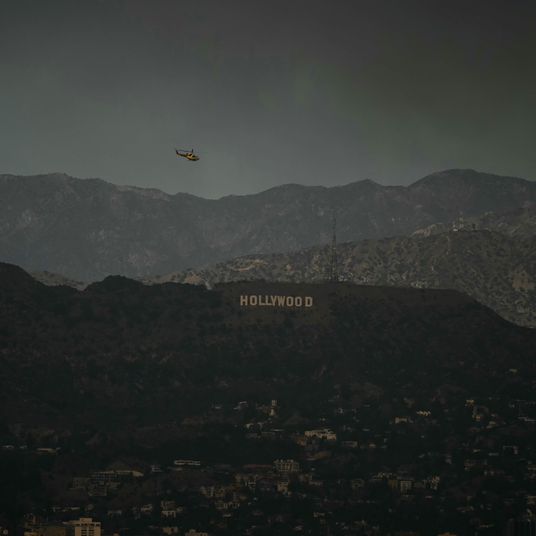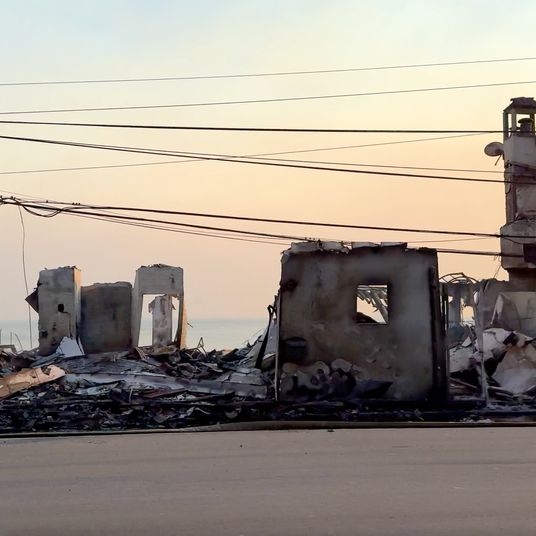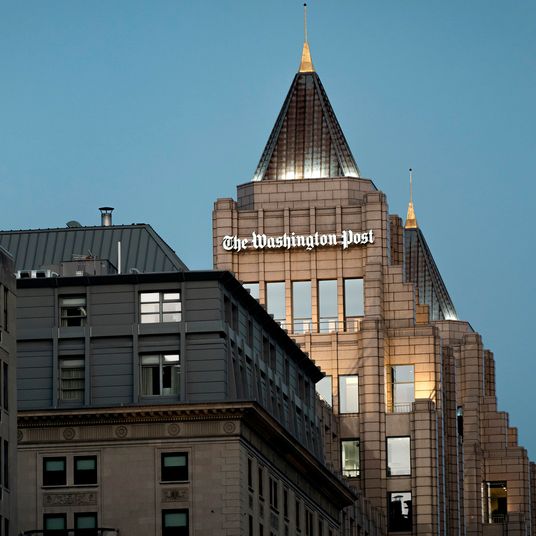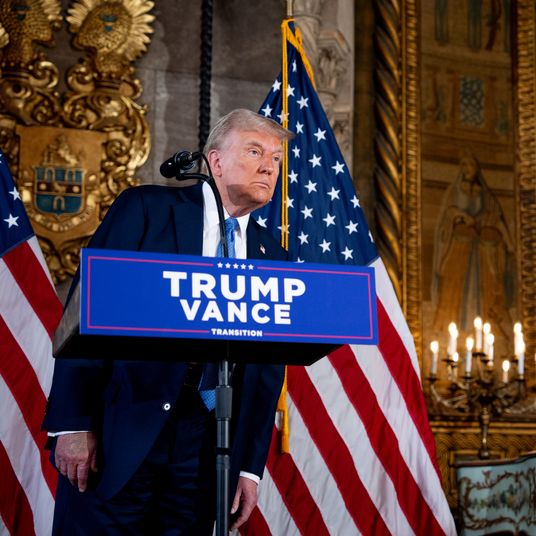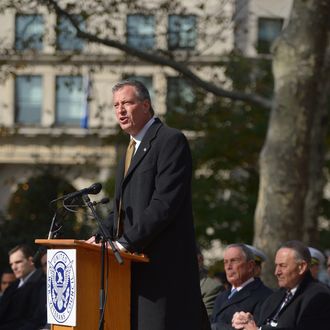
After a trip to Puerto Rico and a week of lying low, the mayor-elect made an appearance before the press today at the George Soros–funded Talking Transition think tent in Manhattan. “It’s much more elegant than your average tent,” said Bill de Blasio once inside the space, which aims to foster discussion and transparency as the city changes hands. “If you give people a chance to offer their ideas, you’ll find positive, productive ideas that people in City Hall didn’t think of,” he said (like “more cronuts!” and “more pet horses for beter things [sic],” for instance).
On the always-hot topic of the next police commissioner, De Blasio confirmed that he’d talked to former NYPD boss Bill Bratton, with whom he has “a great deal of agreement on the core issues,” about returning to the gig. (“I haven’t been asked yet, I’m not applying for the job,” said Bratton yesterday. “If asked, I’ll certainly consider it.”)
De Blasio said he’d also spoken about the position with NYPD Chief of Department Philip Banks and Deputy Police Commissioner Rafael Pineiro, but that no decision has been made. “I don’t make my decisions based on public discourse,” he said.
The prime reason for his appearance at Talking Transition, though, was to talk transition: The mayor-elect announced his newly rounded out, 60-person transition team, which includes AOL CEO Tim Armstrong, Sex and the City and De Blasio ad star Cynthia Nixon, and former White House deputy chief of staff Harold Ickes. Here’s the full committee:
Jennifer Jones Austin, Co-chair, Transition NYC
Carl Weisbrod, Co-chair, Transition NYC
Thelma Golden, Director and Chief Curator, Studio Museum of Harlem
Dr. Marta Moreno Vega, President and Founder of Caribbean Cultural Center African Diaspora Institute
Cheryl Cohen Effron, Founder, Greater NY; Former President, ATC Management
Karen Brooks Hopkins, President, Brooklyn Academy of Music
Alexa Avilés, Program Officer, Scherman Foundation; Co-President, Parent Teacher Association of Public School 172
Zakiyah Ansari, Advocacy Director, Alliance for Quality Education
Maxine Griffith, Executive Vice-president and Special Adviser for Campus Planning, Office of Government and Community Affairs, Columbia University
Kate Sinding Esq., Senior Attorney, New York Urban Program, Natural Resources Defense Council (NRDC)
Hon. Dr. Una S.T. Clarke, Former Councilmember, 40th District
MaryAnne Gilmartin, President and CEO, Forest City Ratner Companies
Bertha Lewis, President and Founder, The Black Institute
Marcia A. Smith, President, Firelight Media
Ana Oliveira, President and CEO, The New York Women’s Foundation
Rabbi Sharon Kleinbaum, Senior Rabbi, Congregation Beit Simchat Torah (CBST)
Darren Walker, President, Ford Foundation
Martha Baker, Executive Director and CEO, Nontraditional Employment for Women (NEW)Dr. Katherine La Guardia, Assistant Clinical Professor, Obstetrics, Gynecology, and Reproductive Science, Mount Sinai Medical Center
Dr. Conchita M. Mendoza, Chief of Geriatrics, University Hospital of Brooklyn, Long Island College Hospital
Cynthia Nixon, Actress, Artist, Activist
Arnold L. Lehman, Director, Brooklyn Museum
Oskar Eustis, Artistic Director, The Public Theater
Edward (Ed) Lewis, Founder, Essence Communications, Inc.
Richard Buery, Jr., President and CEO, The Children’s Aid Society
William Floyd, Head of External Affairs, Google, Inc.
Meyer (Sandy) Frucher, Vice-chairman, The NASDAQ OMX Group
Orin Kramer, Founder, Boston Provident LP
Vincent (Vinny) Alvarez, President, NYC Central Labor Council
Peter Madonia, COO, The Rockefeller Foundation
Ken Sunshine, Founder, Sunshine Sachs
Harold Ickes, Former White House Deputy Chief of Staff
Dr. Rafael Lantigua, Professor of Clinical Medicine, New York-Presbyterian/Columbia University Medical Center
John Banks, Vice-president of Government Relations, Con Edison; Board Member, Metropolitan Transit Authority (MTA)
Douglas (Doug) Durst, Chairman, The Durst Organization
Derrick Cephas, Partner, Weil, Gotshal & Manges; Former CEO and President, Amalgamated Bank
Herb Sturz, Co-founder, Vera Institue of Justice
Jeremy Travis, President, John Jay College of Criminal Justice, City University of New York
Rabbi Michael Miller, Executive Vice President and CEO, Jewish Community Relations Council
Pastor Michael Walrond, Jr., Director of Ministers Division, National Action Network (NAN); Seventh Senior Pastor, First Corinthian Baptist Church
Udai Tambar, Executive Director, South Asian Youth Action (SAYA!)
David Jones, President and CEO, Community Service Society of New York (CSS)
Marvin Hellman, President, OHEL Childrens Home and Family Services
Rev. A.R. Bernard, Founder, Senior Pastor, and CEO, Christian Cultural Center
George Gresham, President, 1199SEIU United Healthcare Workers East
Dr. Steven Safyer, President and CEO, Montefiore Medical Center, Albert Einstein College of Medicine
Ken Lerer, Managing Director, Lerer Ventures; Former Chairman and Co-founder, Huffington Post
Imam Khalid Latif, Executive Director and Chaplain, Islamic Center, New York University
Marian Fontana, Board Member, Lower Manhattan Development Corporation, Families Advisory Council
Tim Armstrong, Chairman and CEO, AOL, Inc.
Kevin Ryan, Founder and Chairman, Gilt
Pam Kwatra, President, Kripari Marketing; Executive Committee, Indian National Overseas Congress
Elsie Saint Louis, Executive Director, Haitian-Americans United for Progress, Inc.
Vanessa Leung, Deputy Director, Coalition for Asian American Children & Families
Paula Gavin, Executive Director, Fund for Public Advocacy
Kim Sweet, Executive Director, Advocates for Children of New York
Dr. Marcia Keizs, President, York College, The City University of New York
Jukay Hsu, Founder, Coalition for Queens
Arnie Segarra, Activist and Longtime NYC Public Servant
Elba Montalvo, Founder, President, and CEO, The Committee for Hispanic Children and Families, Inc.
Mindy Tarlow, Executive Director and CEO, Center for Employment Opportunities (CEO)
Hoong Yee Lee Krakauer, Executive Director, Queens Council on the Arts
Update: Chris Smith, also at the event, adds:
The sheer size of that committee, as well as its racial and gender diversity, and today’s tent event were useful symbolism. De Blasio says he’s intent on creating a more inclusive government, one that’s more in touch with the city’s grassroots. “This center is affording people an opportunity to share their ideas, share their concerns, in a way that offers more transparency, more openness, more possibilities than has often been the case with government,” De Blasio said. “An extraordinary number of New Yorkers have productive ideas, and many times ideas that people in City Hall or city agencies didn’t think of.”
Oddly, though, his remarks were made without any sort of public address system, so the civilians in the room couldn’t hear what he was saying. Transparency only goes so far in other ways, too. De Blasio dodged a question about where he’s been spending his time, other than to say he wasn’t holding meetings at DiFara’s Pizza. And don’t expect him to disclose contenders or finalists for top jobs. “In some cases I might choose, as I have with police commissioner, to talk about some people we’re considering,” De Blasio said. “But I think given the number of positions we have to fill, the public part of this process is that anyone can put their name forward, or put anyone else’s name forward.”
No one, of course, is expecting him to pick the next schools chancellor through a public show of hands. Yet De Blasio has raised expectations the he’ll run a more democratic city. Many of the Talking Transition tent suggestions are loopy—“stop the immigrants from coming here,” “don’t slut shame”—but others are earnest and interesting. A guy in a floppy hat, disappointed that he arrived too late to talk to De Blasio, instead explained to me his idea for how firehouses should be turned into hubs of information and emergency supplies during natural disasters or power failures. “People can’t just complain about government,” he said. “They have to get involved and do something.” As mayor-elect and mayor De Blasio will do most of his deciding behind closed doors. But if he can harness some of the hope flowing through the transition tent he’ll have a better chance of making those choices work.





